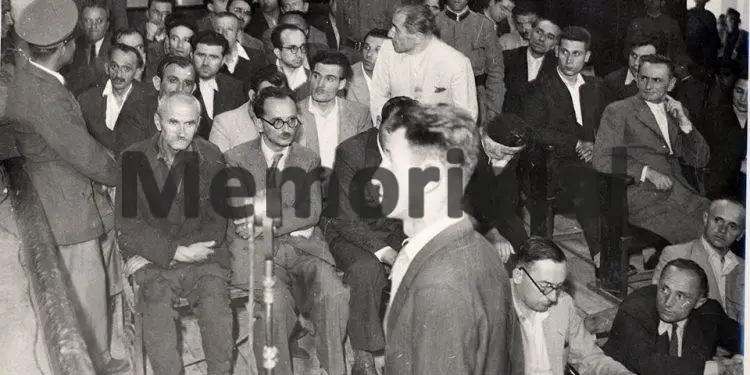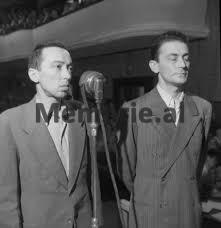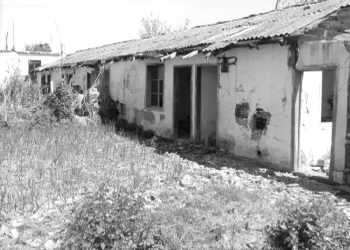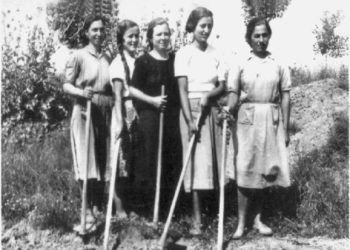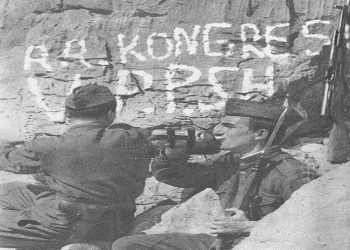Dashnor Kaloçi
The fifth part
Memorie.al/ publishes some archival documents extracted from the Archive of the Ministry of Internal Affairs which belong to the investigative and judicial file of the so-called “Group of Deputies”, which included 24 defendants and among them names and well-known personalities of during the Anti-Fascist National Liberation War and then deputies of the Albanian Parliament or in the Presidency of the Democratic Front of Albania headed by Colonel-General, Enver Hoxha, as Shefqet Beja, Dr. Enver Sazani, Sheh Ibrahim Karbunara, etc., who were brought before a military court headed by Major Niko Çeta and prosecutor Josif Pashko.
What were the accusations formulated by the trial panel against the 24 defendants: Shefqet Beja, Enver Sazani, Sheh Ibrahimi (Karbunara), Selaudin Toto, Irfan Majuni, Tefik Deliallisi, Hysen Shehu, Salim Kokalari, Sulo Konjari, Ramazan Tabaku, Gjovalin Vlashi , Rustem Sharra, Xhevat Xhafa, Rram Marku, Beqir Çela, Riza Alizoti, Sulo Klosi, Saggioti Paolo, Foto Bala, Abdyl Kokoshi, Shefki Minarolli, Pertef Karagjozi, Mehmet Prishtina and Agathokli Xhitoni?
What did the defendants of the “Parliamentary Group” testify during the investigative and judicial process, regarding: their organization, the branches they had in different districts of the country, the people who headed them, the connections with the anti-communist resistance groups that were on the run, or nationalist exponents of Balli and Legality who were in the Italian camps, the support they had from the Anglo-Americans and their missions operating in Albania, the connections with senior senior military of the Ministry of National Defense and that of Internal Affairs, and to people with high functions, near Enver Hoxha, etc.
The documents we are publishing in this article belong to the judicial and investigative file of the so-called “Group of Deputies” who were arrested and taken as defendants by the communist regime of Enver Hoxha, being placed in the dock of the accused in early September. 1947. In that trial which took place in the Cinema “17 Nëntori” of the capital from 4 to 27 September, when the claim was given, 24 people were tried as defendants, most of whom were well-known personalities. of the Antifascist National Liberation War.
Most of them were well-known intellectuals who had graduated from Western universities and some of them, such as Shefqet Beja, Enver Sazani and Sheh Ibrahim Karbunara, were members of the Albanian Parliament, nominated as candidates of the Democratic Front led from the Communist Party led by Enver Hoxha.
Apart from these three very well-known nationalists and very popular all over the country, who were the leaders of that group of defendants, known as the “Group of Deputies”, a large part of them were anti-Zogists and had supported or had taken an active part in the Anti-Fascist National Liberation War. Also, in that group were other intellectuals and various merchants, who had not joined any of the three political forces (Balli, Legality and the Communist Party) during the war, but who had frozen and embraced liberal ideas. -democrats of Western countries where they had studied, having strong anti-communist tendencies.
The trial of the “Group of Deputies” which began with a great pomoz by the propaganda of the communist regime, making available its entire arsenal of radio, newspapers and posters pasted on the walls, in terms of size and importance of his, was the second largest process developed up to that time since the end of the War. The first trial took place in March 1945, known as the “Special Trial against War Criminals,” and at the dock of that trial, 64 people appeared, most of them holding senior positions. in all Albanian governments from that of Ismail Qemali, to those under German occupation, such as deputies, prime ministers, ministers, prefects, mayors, ambassadors, senior military, etc.
Unlike the Special Court of March 1945, where all those persons whom the communist regime of Enver Hoxha had declared as “enemies and war criminals” were tried as defendants, the trial of the Group of Deputies, which began on September 4, in 1947, there was an even greater political and social burden, and of extraordinary interest, as some of the personalities who had joined the ranks of the Democratic Front, led by the newly ruling Communist Party, were tried there.
From various testimonies obtained from the family members of the “Group of Deputies”, as well as from the former military of the Ministry of Interior of that time, almost all the defendants of that group, during the investigation process were subjected to torture by the most inhuman in order to accept the accusations leveled against them by the investigators. It is clearly seen from the court file of that process, where some of the defendants during their trial denied the evidence they gave during the investigation, saying: “We were not able and we signed them.”
In addition to those testimonies denied in that trial, there is much other evidence by the defendants in that trial, which speaks of their anti-communist activity and activity, starting from the period of the War until the time they were arrested. , where Sheqet Beja, Enver Sazani, Ibrahim Karbunara, Hysen Shehu, Tefik Deliallisi, Sulo Kloso, Salim Kokalari, Beqir Çela, etc., have accepted all their activity aimed at overthrowing the Communist Government of Enver Hoxha. Also, in that court file it is seen that the defendants have admitted their connections and cooperation with the Anglo-American missions led by Harry Fultz and General Hodgson, as well as the connections with the main nationalist exponents of Balli and Legality, who were in exile or in fled through the mountains.
In addition to the many testimonies made by the defendants of that trial, (always referring to the file in question), which show their connections and anti-communist activity to overthrow the communist regime, one of the most interesting testimonies in that trial is that made by Tefik Deliallisi, where he tells about the conversation made at the house of Ymer Keçi in Tirana, where Ymeri charged Hamdi Kacolles, (the man who served next to Myslym Peza) with the assassination of Colonel-General, Enver Hoxha and Koci Xoxa, during the visit that they would do in Peza.
Although Memorie.al has the entire court file of this group, which consists of 173 typed pages and has been extracted from the Archive of the Ministry of Internal Affairs, we decided to publish only some of its main parts, giving those in the original version, as they appear in the relevant file.
Minutes of the trial of the “Group of Deputies”
Judging Court
Chairman: Major Niko Çeta
Member: Captain I, Nexhat Hyseni
Captain II, Mustafa Iljazi
Chief Secretary: Aspirant Thoma Rino
Prosecutor: Deputy General Prosecutor, Josif Pashko
Defendants
- Shefqet Beja
- Enver Sazani
- Sheh Ibrahimi (Karbunara)
- Selaudin Toto
- Irfan Majuni
- Tefik Deliallisi
- Hysen Shehu
- Salim Kokalari
- Sulo Konjari
- Ramazan Tabaku
- Gjovalin Vlashi
- Rustem Sharra
- Xhevat Xhafa
- Rram Marku
- Beqir Çela
- Riza Alizoti
- Sulo Klosi
- Saggioti Paolo
- Photo Bala
- Abdyl Kokoshi
- Shefki Minarolli
- Pertef Karagjozi
- Mehmet Prishtina
- Agathokli Xhitoni
Followed by the last number
Minutes of the trial of the “Group of Deputies”
Deposits of Dr. Enver Sazanit
I have attended four meetings. In October I gathered to discuss the elections. In this meeting, Shefqet Beja said that the Front is strong, so we have two options, either to come out as opposition outside the Front and to ask the Anglo-American missions to put pressure on the Government to leave the elections free, or to enter inside Front. Selaudin Totua and Kol Kuqali were assigned to talk to the Anglo-Americans.
At the meeting we held in November it was decided that in places where there are our candidates within the Front, these should support and where there are no elements of ours to propagate to abstain. In this way the circuits were also instructed. We, as MPs, had as a program to oppose and sabotage any issue proposed in parliament.
With the foreign fugitives I have been linked to the Anglo-American side and with the internal fugitives through Faik Shehu, Riza Dani and others. We also sent aid to the fugitives, which was received by the Anglo-Americans. I know that our organization had set up committees in Durrës and later in other places. It was decided for the Shkodra uprising that I was in Korça, but when I returned I was told that Riza Dani was in charge of this.
I had connections with Shefqet Beja and Salim Kokalar. There was only one meeting in my house. It is not at all true that I sent letters to the Anglo-Americans after the committee related to them did so through Selaudin Toto and Kol Kuqali. I have had meetings and talks with Dr. Irfan Pustina, Dr. Fejzi Hoxha, Irfan Manjuni, Qemal Karagjozi, etc. with whom I discussed and indirectly criticized the Government.
Shefqet Beja told me that Tefik Deliallisi, Sheh Ibrahim Karbunara and Riza Dani, sabotaged the Agrarian Reform and managed to directly threaten the villagers. Shefqet had already talked to Gjergj Kokoshi, Selaudin Toto, Salim Kokalari in Berat; Kol Kuqali, Kostandin Boshnjaku for the formation of the organization and that Shefqet Beja went to Karbunarë of Lushnja for this work to talk to Sheh Ibrahimi.
I have previously known Shefqet Beja, Selim Kokalar and Selaudin Toton. The central committee had decided that the Gjirokastra regional committee should enter into an agreement with the Greeks. Kol Kuqali and Selaudin Totua have stated that the British had told them that the Greeks would not give you anything from their claims.
On the Prosecutor’s question, the defendant said: After every meeting we had we reported to the Anglo-Americans.
I understood the purpose of the organization from the first meeting, which we would reach with the help of the Anglo-Americans and about the fugitives and the dissatisfied. I have not shown any activity other than the conversations we had with the doctors. The connections with the fugitives of Italy were made by Shefqet Beja, through the Anglo-Americans. In the meetings he attended and Syrja Selfua I was not. Defendant Hysen Shehu: Yes, Enver participated in the meeting when Syrja Selfua was also present.
Defendant Salim Kokalari: Yes, he was too.
Defendant Enver Sazani continues: I knew that there was sabotage everywhere and that there were groups of saboteurs.
The prosecutor took the floor and said: The defendant will present himself as a simple member of the organization and is in fact one of the initiators of the creation of the organization. Defendant Enver Sazani continues When the ‘Shkodra Uprising’ took place I was in Korça and when I returned Shefqet Beja told me that this was located in the Central and that the cause for its failure was Riza Dani, I did not approve of this but this may have occurred and why it failed; on this occasion Shefqeti told me that it should be done after we had orders from the Anglo-Americans.
The defense attorney was asked if he had any questions and said no.
You sang the depositions before the investigation and accepted them.
Testimony of Sheh Ibrahim Karbunara
The defendant Sheh Karbunara is interrogated: you were appointed as defense counsel. Lawyer Fuat Fico, whom he admitted.
The indictment of the Prosecutor was sung to you and he said that he did not accept it.
After being asked he stated: I was not a member of the central committee.
Defendant Irfan Manjuni: Yes, he was a member of the Central Committee.
Defendant Sheh Karbunara: I did not attend the central committee meetings.
Defendant Tefik Deliallisi: Yes Shehu has participated in the meetings of the central committee two or three times.
Defendant Sheh Karbunara: I did not establish contact with the fugitives.
The prosecutor took the floor and said: In front of you, Mr. The judge is one of the initiators of the criminal group who is a determined criminal and terrorist. He will also hide before you his criminal and sabotage activity he has done against the people. He is responsible for all the murders committed by the war criminal Hamit Matjani. He in front of you and the people wants to deny all his criminal activity but the court has the facts ahead and must decide. By his attitude he shows that he hates the people. This one with his friends have tried to create and once another April 7 and February 4 in our country.
Sheh Karbunara continues: I did not receive any money from foreigners.
Defendant Enver Sazani: Shefqeti told me that he sent money to Sheh Karbunara.
Sheh Karbunara: I do not know anything about the Shkodra uprising but Arif Gjyli told me that some villagers had risen.
Defendant Enver Sazani: Shefqet Beja told me that Sheh Karbunara threatened the villagers who were given land by the Agrarian Reform.
Defendant Sheh Karbunara: No meeting was held in my house.
Defendant Hysen Shehu: Yes, in our house we had a meeting with my father.
Defendant Sheh Karbunara: I do not know in what place the committee meetings took place.
The prosecutor took the floor and said: From the defendants until now all their sabotage treacherous activity came to light.
I want to add Mr. Judge that the defendant Sheh Karbunara has always been a swindler politician and has become a tool of any regime to the detriment of our people. This is Sheh Ibrahim Karbunara in front of you, who with his determination seeks to deny and hide the criminal activity, despite what his friends and his son told him in front of his eyes. Here it was proved that the first meeting for the formation of the treacherous organization was held in his house. The court has complete and quite convincing facts about his guilt.
Defendant’s defense attorney was asked if he had anything to say and said he had nothing to ask.
Testimony of Prof. Photo Bala
Defendant Foto Bala is questioned.
You were appointed as defense counsel, Mr. Dhimitër Shkurti whom he accepted.
The indictment of the Prosecutor was sung to you and he said that he accepted it but with few reservations regarding the first point.
After being asked, he stated:
During the occupation I was a professor in Tirana; I have not participated in any organization. The liberation of Albania found me in Tirana. I started my activity against the Government virtually in March 1945 and effectively in June 1945. The first to speak to me here in Tirana was Abdyl Kokoshi who, taking advantage of my dissatisfaction with my father’s sentence and my transfer to Gjirokastra, found the case and told me that: you should not be upset as this situation is going to change soon, since we have received news from war criminal fugitives in Italy like Mithat Frashëri, Hasan Dosti and others, who instruct us to increase the ranks of our organization and other organizations in order to overthrow the Government with the help of the Anglo-Americans.
Abdyl told me that you, as a worthy son of your father, should also come, and I told him that I was not coming, he told me that if you came there you would see people who would be surprised, but I did not go. After a while he met me again and after he had found out that I had been transferred to Gjirokastra and was preparing for me to go, he told me to go to Gjirokastra to participate in our committee, giving me a note for Aqif Kashau.
When I went to Gjirokastra I met Aqif who told me that we have formed the committee and it consists of Aqif Kashau, Qëndro Papavangjeli and Sherif Karagjozi, for whose formation Surja Selfua and Ivzi Kokalari had gone as delegates from the central committee of Tirana. All the time I have participated in four meetings held by the Gjirokastra committee. We held the first meeting at the end of June 1945, where Aqifi, Qendro Papavangjeli, Sherf Karagjozi, Isufi and others were.
Here we have decided to do propaganda in taxed traders, among aghallars, beljer and in the families of convicts in order to increase the ranks of the forehead. In another meeting it was decided to set up committees in the N / Prefecture as well. Our plan was to propagate against the Government, to expand the ranks, to provoke an uprising, and with the help of the Anglo-Americans to overthrow the government. Here the work was divided and everyone from one sector took over, I undertook to carry out activities with Professor Hilmi Hysi, who told me that we must necessarily organize, increase the ranks and form n / committees in n / prefectures. Those who were free would go to the prefectures.
Isuf Hysen Begasi was elected chairman of the committee, Hilmi Hysi vice-chairman and I, Aqifi and other members. I talked to Hilmi Hysi when he came to Gjirokastra and he told me that the Central Committee was formed in Tirana with Van Filip, Abdyl Kokoshi, Demir Kallarati, Surja Selfon, Sulo Klosi, Isuf Hysen Begas and other elements of Balli. Hilmiu expressed his regret that he was transferred from Berat to Gjirokastra after he had formed a circle of acquaintances in Berat and could work harder.
Isuf Hysen Begasi, told me that in Tirana the Committee was formed by various groups such as Balli, social democrats, demo-Christians, legalists, and Sami Qeribashi’s group. The organization’s support was in helping Anglo-Americans and foreign and domestic war criminals. Isufi was related to a chairman of the northern Epirus organization called Zerri. Committees were formed in all prefectures except Kurvelesh. Pertef Karagjozi and Aqif Kashau were appointed to go to the sub-prefectures.
End of litigation
After the testimony of the 24 defendants in the trial of the “Group of Deputies”, that trial which was mounted entirely by the State Security, was closed on September 27, 1947, when the claim and the decision of the Military Court were read.
Almost all the testimonies read by the defendants during the trial were either obtained through physical and psychological violence and inhuman torture during the investigation, or were written by the Security and the defendants’ investigators were forced to read them. Those in court.
But it must also be said that the defendants in that trial, and those accused of having links with them, were for the most part Western-educated, social-democratic intellectuals who aspired to a democratic system and did not hesitate to openly expressed those ideas that were in conflict with the communist regime of violence, which was being decided at the time by Enver Hoxha.
In this prism, that large group of intellectuals was also the hope of political fugitives and anti-communist resistance groups located in the mountains of Albania, who, presenting their names to the Anglo-Americans, to show them that they had great support in the country and awaiting their landing to overthrow the communist government of Tirana.
Through that rigged process, Enver Hoxha, first, aimed to subdue and eliminate the true democratic opposition, and second, to present them to the people as enemies who were linked to criminals and foreign agents.
To achieve these goals, Enver Hoxha went to the end of his goal and ordered the execution of 16 defendants in that trial, as well as severe sentences for dozens of others from different districts, who were accused of links and cooperation with “Group of Deputies”./Memorie.al




